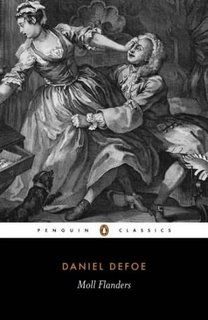24. Daniel Defoe - Moll Flanders (1722)

Buy it
At Amazon UK
Review
Francisco: Defoe writes the most powerful woman character in the list up until now. Moll is an independent woman who owns her own life, even though that life is full of problems which arise mainly from her own decisions, the simple fact that she is able to make those decisions make this a book apart.
Most female characters in previous books, even the ones written by women like the Princesse de Cleves or Love In Excess are victims to exterior forces or to their own weakness. Cleves is the strongest character who is able to separate her passion from her rational needs. Defoe takes it one step further and Moll becomes a character who will do many things for her own profit, in fact she fights for herself and her position in life.
Of course this isn't something to be admired in Moll, it should be showing us the error of her ways, particularly in terms of criminal activity. Defoe is not against women's independence however, just against the means, and when Moll achieves religious redemption she gets her fortune and even though married, is independently wealthy, and ends the book rich, happy and penitent.
One fault of this book is the fact that it reads like a fly on the wall documentary, even though Moll is the narrator she doesn't seem to express her feelings or her thought as much as I would wish, the book follows her actions around more than anything. Defoe proves, as he would later with Roxana, that he can write strong women like no other person at the time. Kudos.
Vanda: Oh, this was great. Truly great. Moll is a fantastic character, the story is well told, and Defoe comes across once again as a truly sensitive, non-judgemental writer, that is incredible at putting himself in the shoes of his main character, be it a man in a desert island, or a woman trying to fend off for herself after being born in a prison.
I really enjoyed the fact that although Moll does commit a series of crimes, marries several times for money (always in an incredible intelligent way, although usually not with very good outcomes), and even accidentally marries and has children with her own brother, Defoe never judges her actions. They are always presented in a point-blank manner, and although there are some mentionings of she being sorry and penitent, she pretty much gets away with it all, remaining strong and dusting herself off everytime tragedy occurs. How shocking must this have been.
Now, while I don't condone the whole stealing/marrying for money malarky, Moll's strenght appealed to me more than any other character's written by women so far. Isn't this strange? I'd rather have her as a role model, with all her resourcefullness, independence, intelligence, and sheer strenght. Huzzah for whores, I say. And huzzah for Defoe.
Final Grade
Francisco: 8/10
Vanda: 8/10
Trivia
From Wikipedia:
Defoe himself was a noted Puritan. His views are unambiguous, in that he believes and writes for hard work, devotion, and the work of providence as grace. There is some debate, however, as to whether Defoe intended Moll as an entirely sympathetic character. The novel, devoting many pages to crime and sin and very few to repentance or even remorse, leads the reader to question Moll's desire for forgiveness. She is therefore an ambivalent character. Some have even speculated that Defoe intended the book partially as a titillating moneymaker. These arguments often allude to Defoe's preface, in which he mentions "lewd ideas" and "immodest terms" that could lead the audience to read the work for scandalous entertainment instead of moral value.
The novel combines Defoe's interests in conversion narratives with his experience and interest in crime. Moll Flanders was a popular novel, and Defoe's reputation was aided by it. He had earlier written about criminals for various journals, and Moll Flanders increased his cachet as a writer of criminal lives. Soon after the publication of Moll Flanders, he wrote two different lives, of Jack Sheppard, the Cockney housebreaker, in 1724, and a novella length life of Jonathan Wild in 1725. Also in 1724, Defoe returned to the subject of fallen women with an even more salacious Roxana. The life of Moll Cutpurse, who is mentioned in the book, undoubtedly inspired Defoe although she is quite a different character to Moll Flanders.
From the point of view of historians, Moll Flanders is valuable for its information on the life, punishment, and habits of the criminal world. In addition to being one of the few detailed descriptions of life in The Mint, it is also one of the best narratives of life in Newgate prison, the punishments of prostitution (as well as a common prostitute's tale), and the way that America was viewed in the early 18th century. The novel is itself a bit of pro-immigration propaganda, in that it portrays America as a place of peace, religious tolerance (so long as it is dissenting Protestant), and opportunity. In contrast to later depictions (e.g. Oliver Goldsmith's The Deserted Village), Defoe's Puritan depiction is naive. Although Defoe is a biased witness, Moll Flanders has a high value for cultural history.

0 Comments:
Post a Comment
<< Home